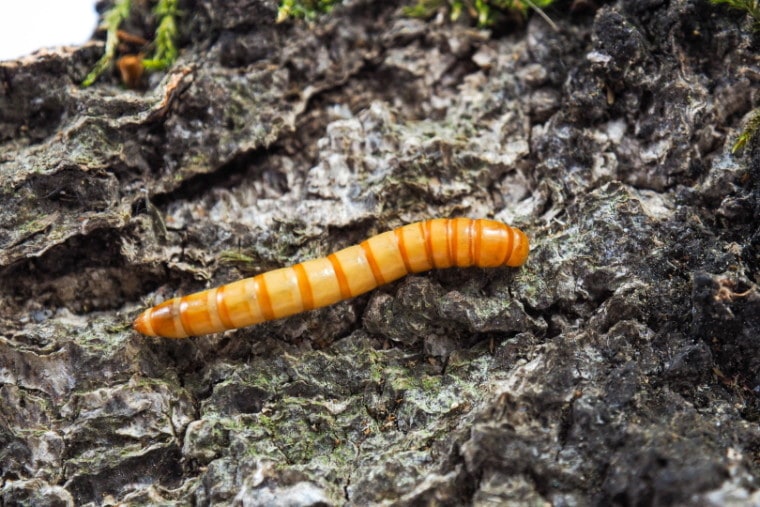
The life of a mealworm is pretty simple: it all boils down to rummaging and eating. The source of food? It doesn’t matter to it; as long as it is edible, the mealworm will be satisfied.
As an omnivorous creature, the mealworm will delight in just about anything. It can eat grains, animal products, plants, vegetables, a piece of apple or carrot from time to time, and even table scraps. However, you should check that these foods are not contaminated by an insecticide or other pollutants.
You can also give them bran, bread, cat food, or any other dried food. Besides, mealworms have a cannibalistic inclination; they will not hesitate to devour dead or injured congeners.
 Quick Facts About Mealworms
Quick Facts About Mealworms
| Scientific Name | Tenebrio molitor |
| Order | Coleoptera |
| Family | Tenebrionidae |
| Type | Insect |
| Lifespan | 2 to 6 months as larvae before turning into beetles |
| Size | 1 inch |
| Habitat | Worldwide; they prefer dark and moist areas |
| Diet | Omnivore |
Mealworms Overview
If you have an exotic animal in your home, be it any type of reptile, you’re probably familiar with the mealworm. As a quick reminder, mealworms are the larvae of several species of beetle insects of the Tenebrionidae family, which thrive in flour and various starchy foods. These large larvae are reared for the fishing bait and animal feed markets, and even human food.
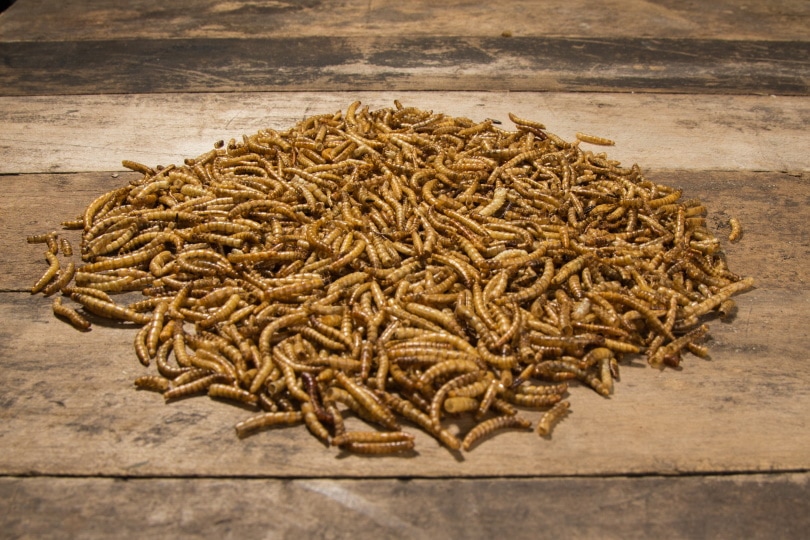
What Is the Mealworm’s Staple Diet?
The mealworm’s staple diet can also serve as a substrate; therefore, you have several choices available to you. Bran, grain mix, and flour are great options.
You can also supplement the staple diet of your mealworms with the following foods:
Tips: To avoid any mold or other problems, do not place the plants directly in the substrate but in a small container that you will put in the middle of your breeding box.
Also, use a slightly porous material so that they can climb inside.
How Often Do Mealworms Need to Be Fed?
You can feed your mealworms as often as you like. They will become plump and grow bigger faster; your reptile (or other pet) will love it! It is best to leave food in the bin all the time; however, be careful not to let the food rot or attract other unwanted insects.
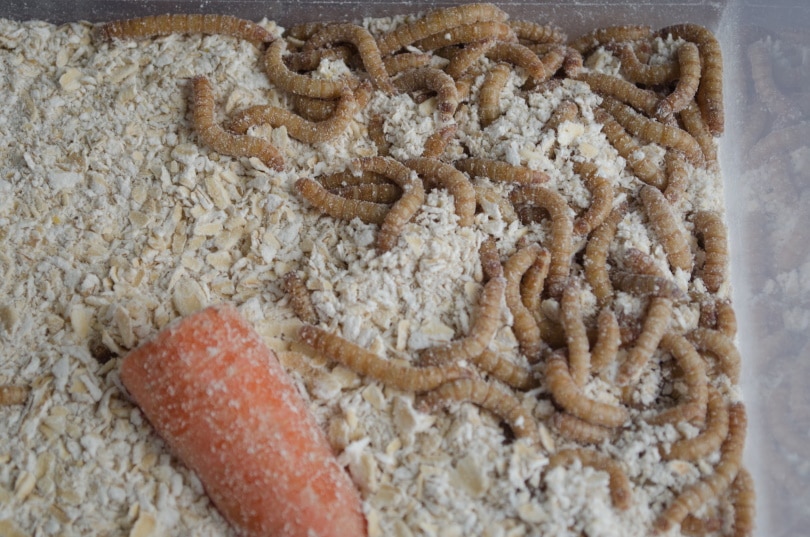
Do Mealworms Need Water?
One of the benefits of raising mealworms is that they don’t need a water supply. Indeed, these insects are particularly effective in extracting water from their food. However, it is recommended to provide moisture in food, such as pieces of fruit (apples) or vegetables (carrots, potatoes). This way, the mealworms will absorb all the water they need from their food.
What Do Mealworms Eat in Their Wild Habitat?
Mealworms prefer damp and dark places, which is why they like to hide in rotten wood, animal burrows, under rocks, etc. In the wild, they devour the leaves of decaying trees, dead or rotten plants, and even other dead or injured insects. Therefore, they play a significant role in the ecosystem by helping the decomposition of any spoiled organic material.
You can also find them in warehouses, mills, and farms; chances are they are reveling in stored cereals and other grains!
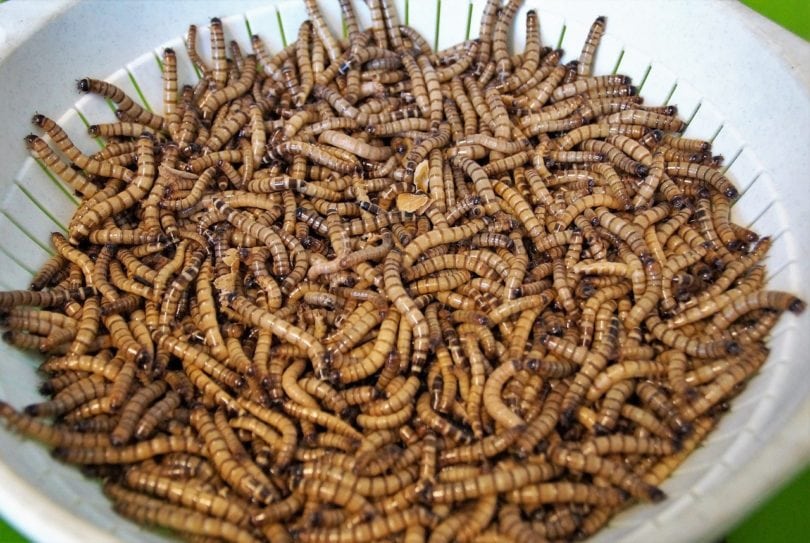
What Is the Nutritional Value of the Mealworm?
Mealworms are rich in high-quality proteins, fatty acids, dietary fibers, and a variety of micronutrients. However, they also have a high chitin content that makes them an indigestible insect that shouldn’t be fed regularly. Therefore, you should feed mealworms to your exotic pet occasionally, mainly when it is still tiny or when it has just molted. In this case, it will be almost white.
Here are the main constituents of dried mealworm larvae:
| Protein | 49.1% |
| Fat | 38.3% |
| Ash | 4.1% |
| Carbohydrate | 8.5% |
Should You Dust Mealworms With Minerals?
Mealworms, and insects in general, are poor sources of minerals. This is because, since invertebrates do not have a skeleton, a diet composed only of mealworms will not meet the mineral—and especially calcium—needs of your exotic pet. To remedy this, many exotic pet owners recommend dusting your mealworms in a supplement made with calcium and other vitamins before mealtime or using the gut-loading method.
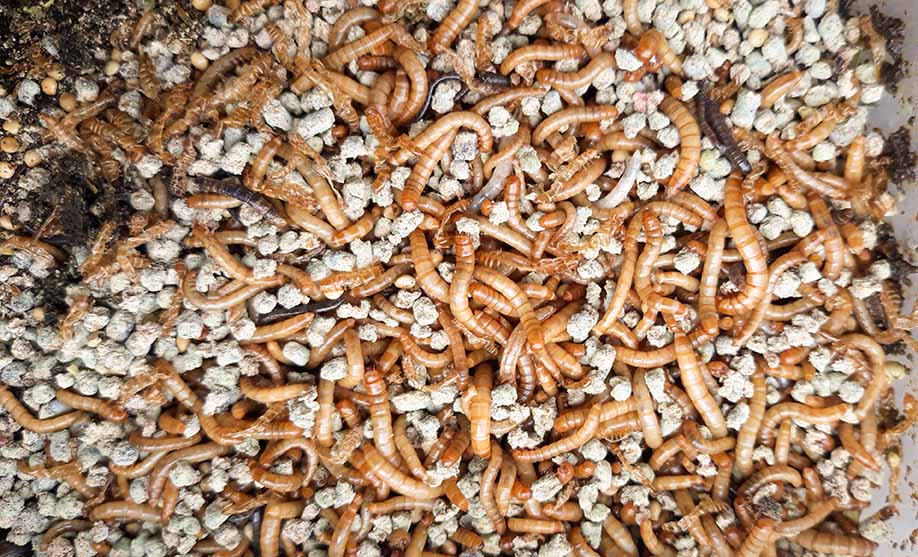
Important: Ask your veterinarian for advice before using these methods. Depending on your exotic pet’s mineral needs (whether it’s a chameleon, snake, bird, or frog) your vet will be able to advise you and tell you which powder supplement is suitable for your pet.
Which Animal Eats Mealworms?
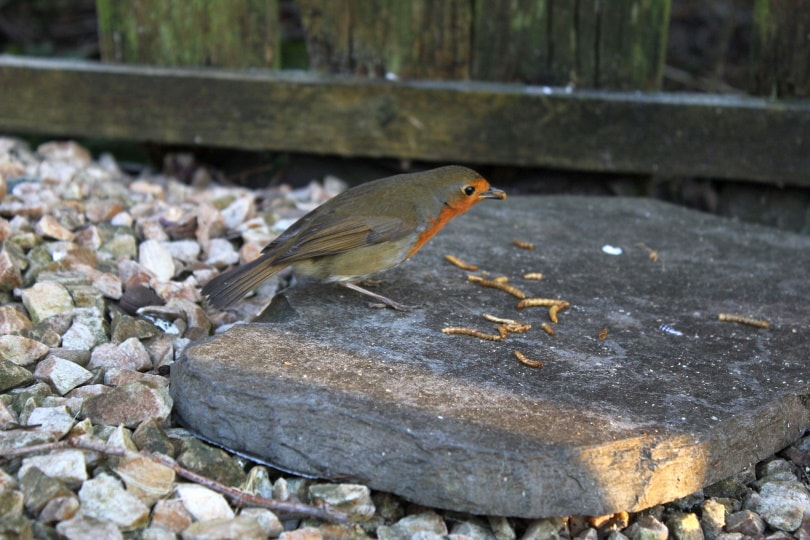
Mealworms are used as food for many exotic pets and insectivorous species: birds, reptiles, amphibians, fish, and rodents. But you may not know that mealworm is often used as a dietary supplement in several countries, mainly in Asia. Indeed, mealworms have a real nutritional benefit. For equal mass, there is as much protein in mealworms as in beef. Mealworms also contain many nutrients and vitamins, such as omega-3, omega-6, or vitamin B12; they are also rich in iron, zinc, and fiber.
For equal mass, there is more fiber in mealworms than in broccoli! So, the next time your kids refuse to eat their vegetables, give them a little mealworm dip. However, we cannot assure you that you will have much success with this slightly…exotic substitution!
Bonus: For those who would like to know more about the benefits of eating mealworms, read on:
Humans and the mealworm diet
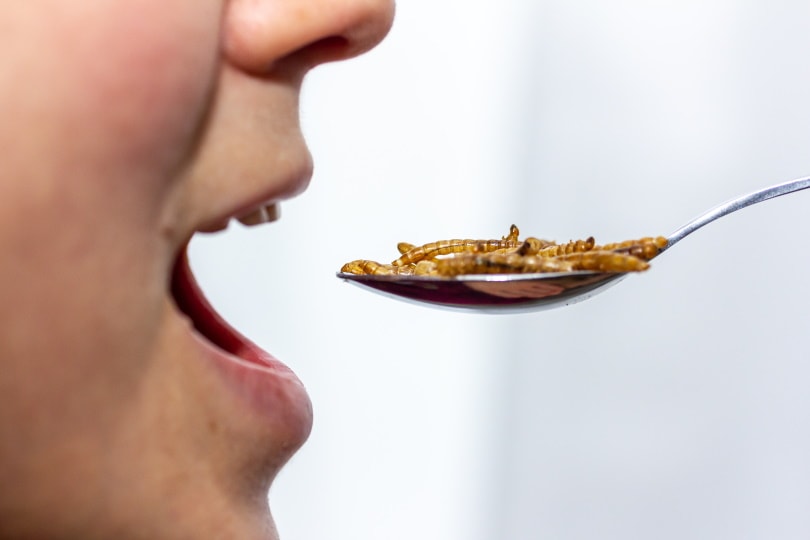
This study found that consuming mealworms had more nutritional and environmental benefits than consuming other traditional farm animals. The authors explored the possibility of replacing traditional meat products with insects as an alternative source of protein, mainly to reduce environmental pollution and water scarcity. Moreover, they found that the edible portion of mealworms is 100% of the insect’s weight, while in pigs, beef, and chickens, the edible part is much less than their total weight.
Besides, already consumed in more than 80% of the world’s countries, mealworm proteins are also of good quality in terms of nutritional value. They contain all 20 essential amino acids, which is comparable to beef.
Authors concluded, “that integrating diets with insects and, in particular, with mealworms can contribute to a more sustainable way of feeding the growing human population”.
 Final Thoughts
Final Thoughts
Mealworms are easy-to-breed insects that provide a good source of protein and fat for your exotic pets. They are not picky eaters at all; they will eat whatever you give them but make sure you provide them with adequate nutrition, consisting mainly of cereals, grains, flour, fruits, and a few vegetables here and there. And if you ever feel like it, you could even have a little taste of these chubby and nourishing insects!
Featured Image Credit: Triple F, Shutterstock

 Quick Facts About Mealworms
Quick Facts About Mealworms





